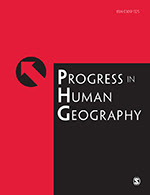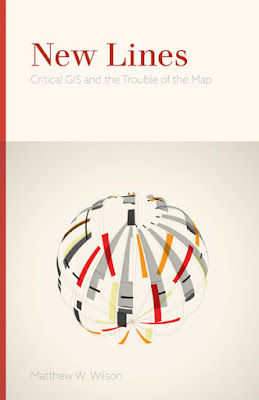GIScience I: Social histories and disciplinary crucibles (or how to think progress otherwise?)
When invited to author three Progress reports for PHG on the topic of GIScience, I was so honored to be selected for such a task -- even as I felt largely uncertain about what I might say about the 'progress' made in GIScience, especially as the bulk of my writing has questioned the agenda of such a subfield. I also felt the weight of such a responsibility, as these reports in PHG have been so useful to my own process of learning in the discipline.
Assured by friends and colleagues, I accepted the invitation and decided to start by reading the previous reports on GIScience (there were nearly 40). I found myself interested in the ways that these reports, and their authors, represented developments in cartography and GIS back to an audience of human geography readers. I wondered about the role of positionality in their authoring, about how nearly 40 years of what would become GIScience reports were written entirely by white men, except for one trilogy beginning in 2009 by Sarah Elwood. As someone interested in storytellings around technology, I was curious: what might these storytellings in the pages of Progress say about the mattering of GIS? How might they illustrate the limits of GIScience, today?
I reviewed these reports, extracted their thematics, and then wondered about all the progress otherwise in the discipline. If we were to understand Progress reports on cartography and GIS to operate as molar or major formations (drawing on Cindi Katz's development of minor theory), what might be the molecular or minor formations that offer resistance or recalibration? How might I write a Progress report that utilizes those previous reports, not as the sacred text of the subfield of GIScience, but as a backdrop to the multiple, divergent, mischievous scholarship that makes trouble of cartography and GIS? How might we understand these as minor gisciences? How might they be important to understanding change in the discipline?
I know this first report likely falls short in many ways. Still, I appreciate the opportunity to provide some thoughts about how narrating 'progress' is a slippery slope -- and one that might offer a moment to challenge and rethink how and for whom progress is made.
GIScience I: Social histories and disciplinary crucibles
Abstract:
In this first report, I overview research on storytelling of the histories of GIS. I suggest that these efforts reveal important pathways for thinking the current moment and conditioning technoscience futures. I argue that these stories around technology illustrate various disciplinary crucibles around technical practices and knowledge work. To report on progress in GIScience is also to narrate the moments of change in the discipline, whether marked as quantitative, qualitative, radical, critical, black, feminist, Marxist, indigenous, environmental, postcolonial, queer, or minor, among others. I suggest ‘minor GISciences’ to encourage attentiveness to the historical conditions and social implications of geographic technologies.
[ Access it here, or contact me for a copy. ]
Assured by friends and colleagues, I accepted the invitation and decided to start by reading the previous reports on GIScience (there were nearly 40). I found myself interested in the ways that these reports, and their authors, represented developments in cartography and GIS back to an audience of human geography readers. I wondered about the role of positionality in their authoring, about how nearly 40 years of what would become GIScience reports were written entirely by white men, except for one trilogy beginning in 2009 by Sarah Elwood. As someone interested in storytellings around technology, I was curious: what might these storytellings in the pages of Progress say about the mattering of GIS? How might they illustrate the limits of GIScience, today?
I reviewed these reports, extracted their thematics, and then wondered about all the progress otherwise in the discipline. If we were to understand Progress reports on cartography and GIS to operate as molar or major formations (drawing on Cindi Katz's development of minor theory), what might be the molecular or minor formations that offer resistance or recalibration? How might I write a Progress report that utilizes those previous reports, not as the sacred text of the subfield of GIScience, but as a backdrop to the multiple, divergent, mischievous scholarship that makes trouble of cartography and GIS? How might we understand these as minor gisciences? How might they be important to understanding change in the discipline?
I know this first report likely falls short in many ways. Still, I appreciate the opportunity to provide some thoughts about how narrating 'progress' is a slippery slope -- and one that might offer a moment to challenge and rethink how and for whom progress is made.
GIScience I: Social histories and disciplinary crucibles
Abstract:
In this first report, I overview research on storytelling of the histories of GIS. I suggest that these efforts reveal important pathways for thinking the current moment and conditioning technoscience futures. I argue that these stories around technology illustrate various disciplinary crucibles around technical practices and knowledge work. To report on progress in GIScience is also to narrate the moments of change in the discipline, whether marked as quantitative, qualitative, radical, critical, black, feminist, Marxist, indigenous, environmental, postcolonial, queer, or minor, among others. I suggest ‘minor GISciences’ to encourage attentiveness to the historical conditions and social implications of geographic technologies.
[ Access it here, or contact me for a copy. ]



Comments
Post a Comment